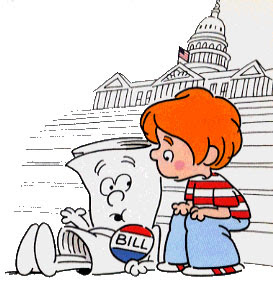About This Guide
The purpose of this guide is to help you perform legislative history research. The home page provides explaination of the legislative process, as well as describes those documents associated with or produced during the legislative process.
The remaining pages will discuss tools for searching for legislative history documents and guidance on locating compiled legislative histories.
This guide will be useful to law students and non law students. Please note, some of the resouces discussed in this guide are publicy available government resources, others require campus log-on. Lexis and Westlaw resources are only available to law students.
I'm Just a Bill....
More Resources
Below is a collection of links to more resources on legislative history, legislative process, and legislative research.
-
Ben's Guide to GovernmentA quick, simple description of how a bill becomes a law.
-
Congress.gov Legislative Process GuideMaterials, glossary, and diagrams related to the legislative process provided by Congress.gov
-
Federal Legislative History Research: A Practitioner's Guide to Compiling the Documents and Sifting for Legislative IntentOutline, written narrative, and research links related to the legislative process and legislative research.
-
How Our Laws are MadeA highly detailed and technical description of the lawmaking process.
-
Library of Congress Legislative History GuideLegislative History guide prepared by the Library of Congress
What is Legislative History & How Can I Use It?
Legislative history is a term that refers to the documents that are produced by Congress as a bill is introduced, studied and debated. These legislative documents are often used by attorneys and courts in an attempt to determine Congressional intent or to clarify vague or ambiguous statutory language.
Legislative documents are persuasive legal authority, meaning they do not have the force of law. Looking at the related comments and testimony, reports produced by House and Senate commitees, and textual changes to various versions of a bill as it moved throughout the legislative process, however, may help in determining the intended meaning of the law.
Knowing when and how to use legislative documents is not always easy. While this guide provides some basic guidance, you may wish to seek out more information from other sources on legislative history, legislative process, and legislative research.We have provided links to some of these resources in the "More Resources" box on the bottom left of this page.
How a Bill Becomes a Law
Canons on Extrisic Legislative Sources
In addition to the more commonly known textual cannons. Several cannons of construction used by the courts address the application of extrinsic legislative materials. This interpretive guidance can be useful, but remember, it is just guidance. Below is a list of the extrinsic legislative cannons recognized by the Rehnquist Court, along with citations to cases which discussed/ utilized the cannon.
- Consider legislative history if the statute is ambiguous. Wisconsin Pub. Intervenor v. Mortier, 501 U.S. 597 (1991).
- Interpret provisions consistent with subsequent statutory amendments. Sullivan v. Finkelstein, 496 U.S. 617 (1990).
- Be careful when considering subsequent legislative discussions. Compare, Sullivan v. Finkelstein, 496 U.S. 617 (1990) and Musick, Peeler, & Garrett v. Employers Ins. of Wausau, 113 S. Ct. 2085 (1993).
- Committee Reports are authoritative legislative history, but cannot trump a textual plain meaning and should not be relied on if they are imprecise. Johnson v. DeGrandy, 114 S. Ct. 2647 (1994); Southwest Marine, Inc. v. Gizoni, 112 S. Ct. 486 (1991).
- Committee Report language that cannot be tied to a specific statutory provision cannot be credited to that provision. Shannon v. United States, 114 S. Ct. 2419 (1994).
- House and Senate Reports which are inconsistent with each other should be discounted. Moreau v. Klevenhagen, 113 S. Ct. 1905 (1993).
- There is a presumption against an interpretation considered and rejected by floor vote of a chamber of Congress or committee. Campbell v. Acuff-Rose Music, Inc., 114 S. Ct. 1164 (1994).
- Floor Statements can be used to confirm apparent meaning. Department of Revenue v. ACF Indus., Inc. 114 S. Ct. 843 (1994).
- Contemporaneous and subsequent understandings of a statutory scheme (including understandings by the President and Department of Justice) may sometimes be admissible. Hagan v. Utah, 114 S. Ct. 958 (1994); Darby v. Cisneros, 113 S. Ct. 2539 (1993).
- The "dog didn't bark" cannon: Presumption that prior legal rule should be retained if no one in the legislative deliberations even mentioned the rule or discussed any changes in the rule. Chisom v. Roemer, 501 U.S. 380 (1991).
The Law Library

Congress to Year Translation
Legal Research in a Nutshell
-
Legal Research by
ISBN: 0314286659Publication Date: 2013-05-23
Disclaimer
The University of Illinois Law Library provides these Web pages as a service to our users and they are not intended to be taken as legal or non-legal advice on any subject. The legal information provided in this website is for general reference only, and should not be relied upon for legal purposes. You should always consult a lawyer to determine your legal rights.
